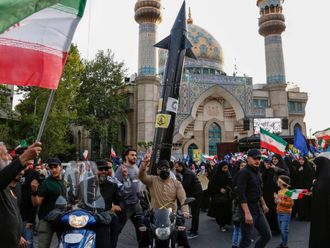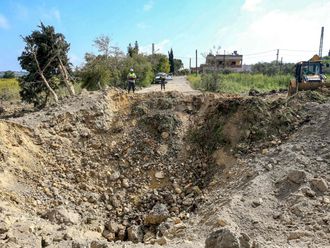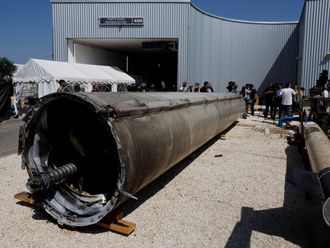
Dubai: On July 11, the Irish Seanad (Senate) made history when it passed legislation banning the importation of Israeli goods from the Occupied West Bank in Palestine—making it the first legislature in the world to do so.
Gulf News spoke with one of the bill’s supporters, Senator Paul Gavan and member of the Sinn Fein party.
Having visited Palestine in 2016, Gavan witnessed first hand the struggles of the Palestinians living under Israeli occupation.
- Paul Gavan | Irish Senator
Drawing from Ireland’s own experience of being colonised by Great Britain, and its struggle for liberation, Gavan said he deeply empathised with the Palestinian struggle.
He supports such movements as the Boycott, Divestment and Sanctions Movement (BDS)—a global movement made up of unions, academic associations, churches and grassroots movements across the world, aiming to apply social and economic pressure on Israel in order to force it to comply with international law and end its transgressions against Palestinians.
He says he hopes the bill will send a strong message to the world about the horrors of the occupation of Palestine as well as pressure Israel to reevaluate its oppressive policies.
GN: Just how did this bill come about?
PG: The bill was introduced by my colleague, Independent Senator Frances Black, with the full support of my party Sinn Fein. We saw the bill as a significant breakthrough as a means of sending a strong message to Israel and the world about the horrors of the occupation of Palestine, and the need for world wide action.
The bill commanded the support not only of Sinn Fein, but of all parties with the exception of the conservative government party (Fine Gael). Thankfully, there were enough votes to ensure the bill passed second stage in the Senate.
GN: Why did you support the bill?
drop in FDI in Israel in 2014 due to BDS movement
PG: I was proud to speak in support of the bill. I used my time to remind all present about the true nature of the state of Israel—which is an Apartheid State.
As such, it needs to be shunned in the same way that Apartheid South Africa was shunned by the international community.
Only an international boycott will force the Israeli State to negotiate for a just settlement and the establishment of a Palestinian State based on the pre-1967 borders. (Israel occupied the West Bank and Jerusalem during the 1967 war in a move never recognised by the international community and continues to build colonies on this land)
GN: Some other senators I spoke, who also supported the bill, were quick to underscore that their backing of the legislation did not mean that they supported the BDS Movement, which calls for the full boycott of Israel.
They stressed that they were not in favour of an all-out Israel boycott, but, by supporting the bill, it was a way to send Israel a message that there would be consequences for its illegal occupation of the West Bank.
What are your thoughts on the matter?
PG: It’s true that some parties are reluctant to fully endorse the BDS movement, which makes it all the more significant that they have now moved to endorse a boycott of Israeli goods from the Occupied Territories.
Sinn Fein’s position is clear—we fully endorse BDS, and we welcome the passing of this bill as an important step on the road to sanctions.
GN: Given the growing influence of the BDS movement around the world and its resonation with many other civil-rights movements, why do you think other governments have been reluctant to pass similar legislation?
PG: The Apartheid State of Israel has a powerful lobbying machine across the world, and of course a powerful ally in the US and President Trump in particular.
They have also developed particularly close ties with the main Conservative party here in Ireland.
That’s why the passing of this bill is so important. It represents a significant change in the position of the body politic of this state, and a defeat for the conservative forces.
I haven’t yet faced any personal or political backlash over my support for the bill.
GN: BDS has a huge and growing support base in Ireland. Why do you think that is?
Start of the BDS movement, with 170 Palestinian groups
PG: There is a huge affinity with the Palestinians and their struggle because of our own struggles against imperialism and colonialism—a struggle that will not be completed until our own country is finally united.
I visited Occupied Palestine two years ago in support of jailed Palestinian hunger striker Bilal Kayed and witnessed first hand the huge affinity between our two nations.
Our delegation included Irish politician Fra McCann a former republican activist jailed in the 1970s.
The name of our own hunger striker and hero Bobby Sands was constantly mentioned by locals I met throughout the Occupied West Bank.
Sinn Fein will always stand with the Palestinian people and their right to nationhood.
We have consistently called for the Irish Government to respect the vote that was taken unanimously in the Irish Parliament in 2015 to give formal recognition to the State of Palestine.
About the bill
The Control of Economic Activity Bill (Occupied Territory) Bill 2018 bans the importation of products from Israeli-occupied Palestinian territories, paving the way for the country to become the first EU nation to enforce a boycott.
The bill, which has faced angry Israeli opposition, prohibits “trade with and economic support for illegal settlements in territories deemed occupied under international law”.
Having been approved in the upper house of the Irish parliament, the Seanad, the legislation will now need to get through the lower house before becoming law.
At Israel’s urging, a previously scheduled vote in January was delayed at the Irish government’s request.
Israel’s foreign ministry, which is headed by the prime minister, Benjamin Netanyahu, had summoned Ireland’s ambassador to Israel, Alison Kelly, at the time.
Netanyahu has denounced the bill, saying it “gives a tailwind to those who seek to boycott Israel and is utterly contrary to the principles of free trade and justice”.
The bill does not ban all Israeli products.
Frances Black, the independent senator who sponsored the bill, said in a statement before the vote that “trade in settlement (colony) goods sustains injustice”.
“In the occupied territories, people are forcibly kicked out of their homes, fertile farming land is seized, and the fruit and vegetables produced are then sold on Irish shelves to pay for it all,” she said.
“These settlements (colonies) are war crimes, and it’s time for Ireland to show some leadership and refuse to support them.”
The bill does not name Israel but instead refers to an “occupying power”.
In 2015, the EU issued guidelines for the labelling of products from Israeli colonies, which it considers illegal and says are an obstacle to peace.
-The Guardian












